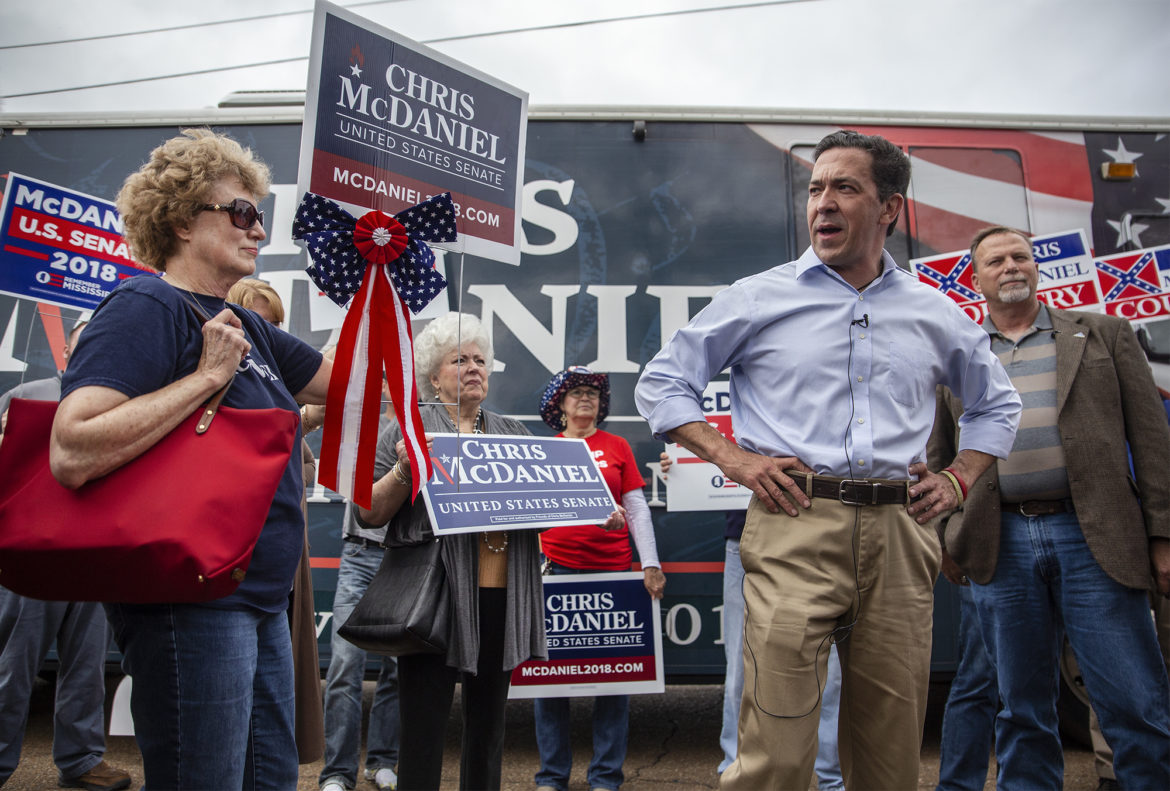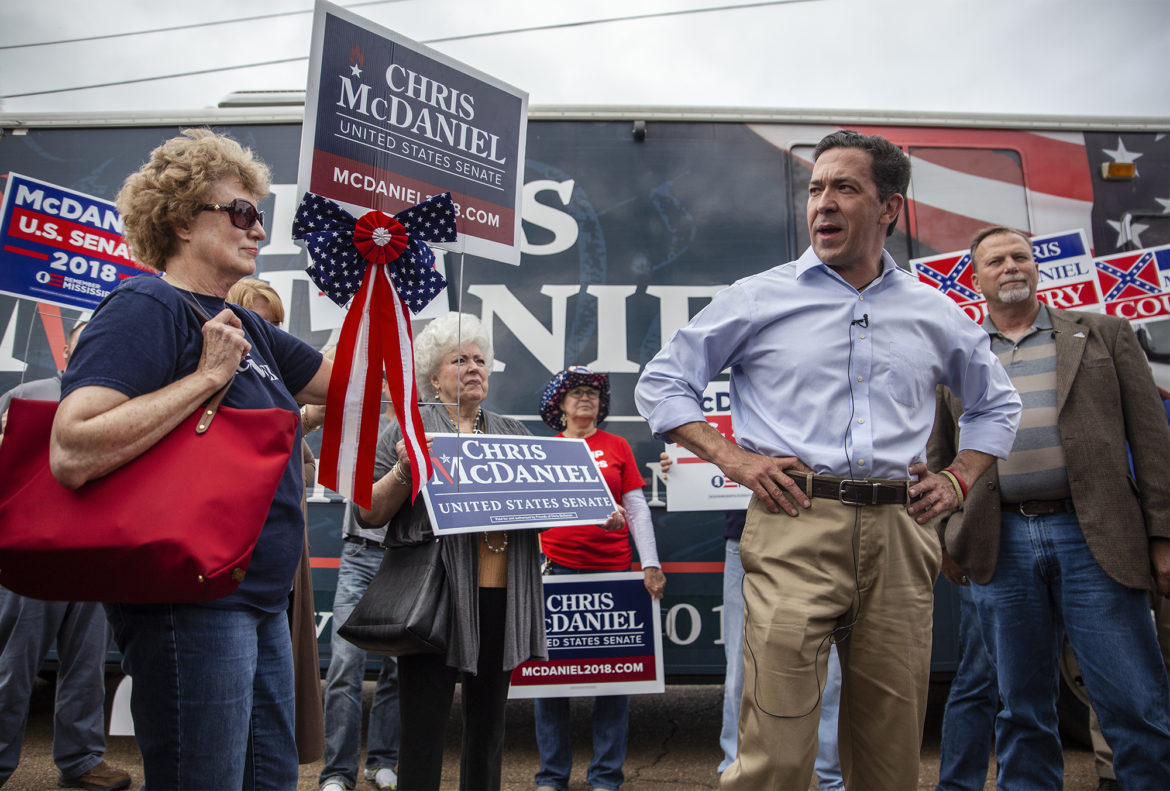Mississippi Today
Chris McDaniel announces an announcement on challenge of incumbent Lt. Gov. Hosemann


Chris McDaniel announces an announcement on challenge of incumbent Lt. Gov. Hosemann
Longtime state Sen. Chris McDaniel on social media late Monday said he’ll announce his campaign plans Jan. 30 at events in Jackson and in Biloxi, leading most observers to believe he’s going to challenge incumbent Republican Lt. Gov. Delbert Hosemann.
Asked for comments or further info on his announcement Monday night, the Republican from Ellisville joked in a text, “I’m thinking (of running for) sheriff. :-)”
In a lengthy interview with Mississippi Today last week, the four-term incumbent senator said he was still undecided about challenging Hosemann, but sounded like a man gearing up for a campaign. He’s been traveling the state for months speaking to various political and civic groups and is co-head of a PAC that has been actively fundraising.
Usually on the outs with the Senate GOP leadership and back-benched for much of his tenure there, McDaniel has not seemed enthusiastic about his current seat for years as he looked to bigger offices.
“Yes, we’ve done polling,” McDaniel said. “My name ID is good. My favorability is good, and (Hosemann’s) unfavorability is higher than mine … Any politician in this state who is challenged from the right is vulnerable in this current environment.”
More than a decade ago, with the rise of the Tea Party, McDaniel became a leader of the far-right GOP and libertarians in Mississippi. In 2014, he made ran a seismic challenge of longtime Republican U.S. Sen. Thad Cochran. McDaniel, with financial support from out of state conservative groups and the state’s first true social media bombardment campaign, led the late Cochran in the first GOP primary vote, then narrowly lost in a runoff.
McDaniel’s run shook the Republican establishment in Mississippi, and has been credited by many as the catalyst for a large shift to the right in state Republican politics. McDaniel himself has said, “I was Donald Trump in Mississippi before Donald Trump.”
READ MORE: McDaniel blasts Hosemann as too liberal, weighs Lt. Gov. run
McDaniel ran for U.S. Senate again in 2018, but lost with only 16% of the vote in a nonpartisan, four-way race. Despite his declared loyalty to Trump, the then-president endorsed Cindy Hyde-Smith, who won the Senate seat.
Many in the GOP then wrote McDaniel off as a fringe candidate with only a small, albeit vocal and loyal, base. But McDaniel has mended fences at least with some in the state’s GOP, including his former political foe Gov. Tate Reeves. In 2019, McDaniel’s surprise endorsement of Reeves appeared to help Reeves garner more of the ultra conservative vote and helped him win a tough Republican primary.
McDaniel said his conservative base is strong and large, and more moderate Republicans are foolhardy to say otherwise.
“They tell themselves that so they can sleep better at night,” McDaniel said. “(His base) is going to exceed 40% on any given day in a Republican primary … Nobody thought Trump had a base, either.”
McDaniel, who serves in the Senate Hosemann oversees as lieutenant governor, has blasted Hosemann as too liberal and questioned his Republican bona fides. So far, Hosemann has not taken the bait and declined comment on McDaniel and his brickbats.
“This is the same Delbert Hosemann who endorsed Ray Mabus instead of Kirk Fordice (for governor). This is the same Delbert Hosemann who endorsed Mitt Romney instead of Donald Trump,” McDaniel said. “There’s consistency there throughout his career where he’s been not simply moderate, but more liberal than moderate … If people get wind of that, yes, he’s vulnerable. The cute commercials are one thing, and they are really clever. But the truth is out there, and it’s not the little lady on the bench, it’s his record.”
McDaniel’s improved relationship with Reeves has had many political observers speculating that Reeves, who has clashed often with Hosemann, is helping and urging McDaniel to run. Both McDaniel and the Reeves camp have denied this. A sitting Republican governor is de facto head of the MSGOP, and helping draft a challenge of a fellow incumbent Republican would be considered unsportsmanlike in political circles.
“(Reeves) has got his own races to run,” McDaniel said. “We haven’t discussed it, and we each have to, in some respects, stay in our own lanes. I consider him a friend, and I chalk our past differences up to misinterpretations on my part.”
McDaniel also refuted widespread rumors that he’s helping draft right-wing challengers of some of his fellow state senators.
“No, that’s not something I’m doing,” McDaniel said. “I can’t be playing checkers all over the state like that.”
But McDaniel said he does not feel as ostracized by the GOP machine as he did when he challenged the status quo with Cochran in 2014.
“I’ve gotten calls from all over — probably two dozen consultants offering to help,” McDaniel said. “These are options I’ve never had before. If anyone wants to help me, they can give me a call.”
McDaniel has in the past struggled to raise campaign money inside Mississippi, and he said he knows Hosemann will be well-funded and “incumbents, they try to clamp down fast on that, with threats, holding contracts over people’s heads.” But he said he’s confident he could raise enough money for a successful challenge.
Plus, McDaniel said social media has helped level the playing field on campaign finances, and he has a strong digital presence, including 305,000 followers on Facebook. In numerous comments on his announcement Monday, many followers said they support him. Many said they would attend his announcement if they lived in Mississippi. Some urged him to run for governor, or for U.S. Senate again.
One urged him, “Stream it live and break the internet!”
READ MORE: Chris McDaniel considered bid for Congress in 2021
This article first appeared on Mississippi Today and is republished here under a Creative Commons license.
Mississippi Today
Speaker White wants Christmas tree projects bill included in special legislative session

House Speaker Jason White sent a terse letter to Lt. Gov. Delbert Hosemann on Thursday, saying House leaders are frustrated with Senate leaders refusing to discuss a “Christmas tree” bill spending millions on special projects across the state.
The letter signals the two Republican leaders remain far apart on setting an overall $7 billion state budget. Bickering between the GOP leaders led to a stalemate and lawmakers ending their regular 2025 session without setting a budget. Gov. Tate Reeves plans to call them back into special session before the new budget year starts July 1 to avoid a shutdown, but wants them to have a budget mostly worked out before he does so.
White’s letter to Hosemann, which contains words in all capital letters that are underlined and italicized, said that the House wants to spend cash reserves on projects for state agencies, local communities, universities, colleges, and the Mississippi Department of Transportation.
“We believe the Senate position to NOT fund any local infrastructure projects is unreasonable,” White wrote.
The speaker in his letter noted that he and Hosemann had a meeting with the governor on Tuesday. Reeves, according to the letter, advised the two legislative leaders that if they couldn’t reach an agreement on how to disburse the surplus money, referred to as capital expense money, they should not spend any of it on infrastructure.
A spokesperson for Hosemann said the lieutenant governor has not yet reviewed the letter, and he was out of the office on Thursday working with a state agency.
“He is attending Good Friday services today, and will address any correspondence after the celebration of Easter,” the spokesperson said.
Hosemann has recently said the Legislature should set an austere budget in light of federal spending cuts coming from the Trump administration, and because state lawmakers this year passed a measure to eliminate the state income tax, the source of nearly a third of the state’s operating revenue.
Lawmakers spend capital expense money for multiple purposes, but the bulk of it — typically $200 million to $400 million a year — goes toward local projects, known as the Christmas Tree bill. Lawmakers jockey for a share of the spending for their home districts, in a process that has been called a political spoils system — areas with the most powerful lawmakers often get the largest share, not areas with the most needs. Legislative leaders often use the projects bill as either a carrot or stick to garner votes from rank and file legislators on other issues.
A Mississippi Today investigation last year revealed House Ways and Means Chairman Trey Lamar, a Republican from Sentobia, has steered tens of millions of dollars in Christmas tree spending to his district, including money to rebuild a road that runs by his north Mississippi home, renovate a nearby private country club golf course and to rebuild a tiny cul-de-sac that runs by a home he has in Jackson.
There is little oversight on how these funds are spent, and there is no requirement that lawmakers disburse the money in an equal manner or based on communities’ needs.
In the past, lawmakers borrowed money for Christmas tree bills. But state coffers have been full in recent years largely from federal pandemic aid spending, so the state has been spending its excess cash. White in his letter said the state has “ample funds” for a special projects bill.
“We, in the House, would like to sit down and have an agreement with our Senate counterparts on state agency Capital Expenditure spending AND local projects spending,” White wrote. “It is extremely important to our agencies and local governments. The ball is in your court, and the House awaits your response.”
This article first appeared on Mississippi Today and is republished here under a Creative Commons Attribution-NoDerivatives 4.0 International License.
Mississippi Today
Advocate: Election is the chance for Jackson to finally launch in the spirit of Blue Origin

Editor’s note: This essay is part of Mississippi Today Ideas, a platform for thoughtful Mississippians to share fact-based ideas about our state’s past, present and future. You can read more about the section here.
As the world recently watched the successful return of Blue Origin’s historic all-women crew from space, Jackson stands grounded. The city is still grappling with problems that no rocket can solve.
But the spirit of that mission — unity, courage and collective effort — can be applied right here in our capital city. Instead of launching away, it is time to launch together toward a more just, functioning and thriving Jackson.
The upcoming mayoral runoff election on April 22 provides such an opportunity, not just for a new administration, but for a new mindset. This isn’t about endorsements. It’s about engagement.
It’s a moment for the people of Jackson and Hinds County to take a long, honest look at ourselves and ask if we have shown up for our city and worked with elected officials, instead of remaining at odds with them.
It is time to vote again — this time with deeper understanding and shared responsibility. Jackson is in crisis — and crisis won’t wait.
According to the U.S. Census projections, Jackson is the fastest-shrinking city in the United States, losing nearly 4,000 residents in a single year. That kind of loss isn’t just about numbers. It’s about hope, resources, and people’s decision to give up rather than dig in.
Add to that the long-standing issues: a crippled water system, public safety concerns, economic decline and a sense of division that often pits neighbor against neighbor, party against party and race against race.
Mayor Chokwe Antar Lumumba has led through these storms, facing criticism for his handling of the water crisis, staffing issues and infrastructure delays. But did officials from the city, the county and the state truly collaborate with him or did they stand at a distance, waiting to assign blame?
On the flip side, his runoff opponent, state Sen. John Horhn, who has served for more than three decades, is now seeking to lead the very city he has represented from the Capitol. Voters should examine his legislative record and ask whether he used his influence to help stabilize the administration or only to position himself for this moment.
Blaming politicians is easy. Building cities is hard. And yet that is exactly what’s needed. Jackson’s future will not be secured by a mayor alone. It will take so many of Jackson’s residents — voters, business owners, faith leaders, students, retirees, parents and young people — to move this city forward. That’s the liftoff we need.
It is time to imagine Jackson as a capital city where clean, safe drinking water flows to every home — not just after lawsuits or emergencies, but through proactive maintenance and funding from city, state and federal partnerships. The involvement of the U.S. Environmental Protection Agency in the effort to improve the water system gives the city leverage.
Public safety must be a guarantee and includes prevention, not just response, with funding for community-based violence interruption programs, trauma services, youth job programs and reentry support. Other cities have done this and it’s working.
Education and workforce development are real priorities, preparing young people not just for diplomas but for meaningful careers. That means investing in public schools and in partnerships with HBCUs, trade programs and businesses rooted right here.
Additionally, city services — from trash collection to pothole repair — must be reliable, transparent and equitable, regardless of zip code or income. Seamless governance is possible when everyone is at the table.
Yes, democracy works because people show up. Not just to vote once, but to attend city council meetings, serve on boards, hold leaders accountable and help shape decisions about where resources go.
This election isn’t just about who gets the title of mayor. It’s about whether Jackson gets another chance at becoming the capital city Mississippi deserves — a place that leads by example and doesn’t lag behind.
The successful Blue Origin mission didn’t happen by chance. It took coordinated effort, diverse expertise and belief in what was possible. The same is true for this city.
We are not launching into space. But we can launch a new era marked by cooperation over conflict, and by sustained civic action over short-term outrage.
On April 22, go vote. Vote not just for a person, but for a path forward because Jackson deserves liftoff. It starts with us.
Pauline Rogers is a longtime advocate for criminal justice reform and the founder of the RECH Foundation, an organization dedicated to supporting formerly incarcerated individuals as they reintegrate into society. She is a Transformative Justice Fellow through The OpEd Project Public Voices Fellowship.
This article first appeared on Mississippi Today and is republished here under a Creative Commons Attribution-NoDerivatives 4.0 International License.![]()
Mississippi Today
On this day in 1959, students marched for integrated schools

April 18, 1959

About 26,000 students took part in the Youth March for Integrated Schools in Washington, D.C. They heard speeches by Martin Luther King Jr., A. Phillip Randolph and NAACP leader Roy Wilkins.
In advance of the march, false accusations were made that Communists had infiltrated the group. In response, the civil rights leaders put out a statement: “The sponsors of the March have not invited Communists or communist organizations. Nor have they invited members of the Ku Klux Klan or the White Citizens’ Council. We do not want the participation of these groups, nor of individuals or other organizations holding similar views.”
After the march, a delegation of students went to present their demands to President Eisenhower, only to be told by his deputy assistant that “the president is just as anxious as they are to see an America where discrimination does not exist, where equality of opportunity is available to all.”
King praised the students, saying, “In your great movement to organize a march for integrated schools, you have awakened on hundreds of campuses throughout the land a new spirit of social inquiry to the benefit of all Americans.”
This article first appeared on Mississippi Today and is republished here under a Creative Commons Attribution-NoDerivatives 4.0 International License.![]()
-

 Mississippi Today6 days ago
Mississippi Today6 days agoLawmakers used to fail passing a budget over policy disagreement. This year, they failed over childish bickering.
-

 Mississippi Today6 days ago
Mississippi Today6 days agoOn this day in 1873, La. courthouse scene of racial carnage
-

 Local News7 days ago
Local News7 days agoAG Fitch and Children’s Advocacy Centers of Mississippi Announce Statewide Protocol for Child Abuse Response
-

 Local News6 days ago
Local News6 days agoSouthern Miss Professor Inducted into U.S. Hydrographer Hall of Fame
-

 News from the South - Alabama News Feed4 days ago
News from the South - Alabama News Feed4 days agoFoley man wins Race to the Finish as Kyle Larson gets first win of 2025 Xfinity Series at Bristol
-

 News from the South - Alabama News Feed5 days ago
News from the South - Alabama News Feed5 days agoFederal appeals court upholds ruling against Alabama panhandling laws
-

 Our Mississippi Home7 days ago
Our Mississippi Home7 days agoFood Chain Drama | Our Mississippi Home
-

 News from the South - North Carolina News Feed7 days ago
News from the South - North Carolina News Feed7 days agoHelene: Renewed focus on health of North Carolina streams | North Carolina

















































